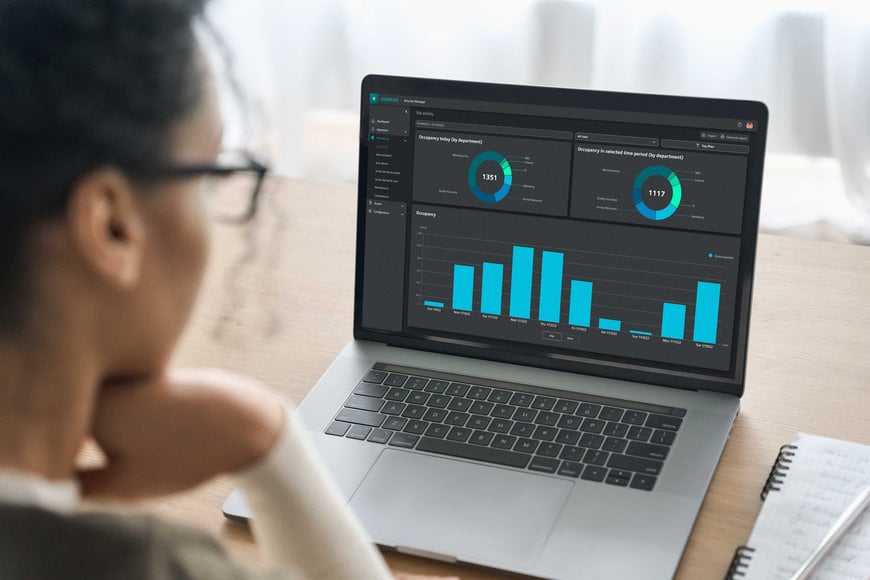smartbuildingmag.com
01
'22
Written on Modified on
Leveraging data from the security cloud
A secure recipe for preventing food waste.

Since the beginning of the pandemic, many company cafeterias have faced a problem: Because employees are coming in to work less consistently, it’s hard to predict how many people will eat in on any given day. As a result, they often prepare more food than they need. Data from buildings’ access control systems could help to reduce food waste.
Anna manages the cafeteria for a company with more than 5,000 employees. Since the start of the pandemic and the “new normal,” Anna has a problem: Far fewer employees are eating in the cafeteria. But what’s worse is that the number of visitors now fluctuates wildly from one day to the next. For example, while only 100 people ate in the cafeteria last Monday, Anna and her team had to feed more than 400 at lunch on Tuesday. These fluctuations make it difficult to plan staffing and manage ordering – and as a result, often too much food is prepared and food is wasted. Help from an unexpected place: the security cloud Of course, what our fictional cafeteria manager Anna and her team need is as much reliable data as possible on how many guests may be expected on a particular day. But where can they get that information? In Anna’s case, from an unexpected source: her company’s security department, or rather, the cloud-based software that was recently deployed.

Data from the security cloud can be used to reduce food waste in canteens.
The new security system provides information about how many people are on site at any given time. Since this data is managed in the cloud, it can be accessed from any location. “Cloud-based security solutions like Siemens Smart Infrastructure’s Security Manager offer dashboards that can be accessed from anywhere, as long as you have the right permissions,” said Daniel Khabbazian, product manager at Siemens. “It’s easy to give cafeteria staff access to selected, anonymized information.”
This sort of dashboard would enable Anna and her teammates to look up, in real time, how many employees are in the office before they start preparing the midday meal. They can also look back on historical data – for instance to estimate in advance approximately how many people might come to the eat lunch in the cafeteria on a given day. And that means they can do something to prevent food waste.
Some initial Siemens projects in Sweden and Germany have proven that this approach isn’t just “pie in the sky” thinking. In these projects, cafeteria staff are already using data from company security systems for this purpose.
Less food waste, more sustainability
When the cafeteria staff does something to reduce food waste, it benefits not only the company but also society as a whole and the environment. Food waste has become a huge problem. The WWF estimates that around one-third of all food worldwide ends up in landfills. That’s alarming from a humanitarian perspective, and it results in unnecessary costs and poses a climate risk. According to a Report by the Intergovernmental Panel on Climate Change (IPCC), 8 to 10 percent of greenhouse gas emissions generated in the period from 2010 to 2016 are attributable to food loss and waste. That means that when Anna and her team waste less food, they’re also helping to protect the world’s climate.
“Anything as a service” solutions open up new possibilities
“It’s great when we can develop valuable solutions in collaboration with our customers,” said Daniel Khabbazian. “Together we’re better able to find new, unconventional approaches.” Khabbazian is convinced that the growth of cloudbased anything-as-a-service (XaaS) solutions like Security Manager will increasingly yield surprising synergies: “Using data from the security system to reduce food waste is just one example of the value that building data can deliver to companies.” Even today, this sort of data can be utilized to explore how individual buildings are used. And that information can serve as an empirical basis for optimizing how spaces are designed.
“Our bi-weekly release cycles ensure that we can offer a continuous improvement of our products, incorporating customer feedback directly. This encourages our customers to co-create, resulting in solutions that can adapt to their changing needs," said Khabbazian.
With all these possibilities, one might almost forget the main purpose of systems like Security Manager: to ensure security within the company and make life easier for security personnel. The fact that it can also help mitigate a major global problem, if only a little bit, is more than just a nice bonus.
www.siemens.com

